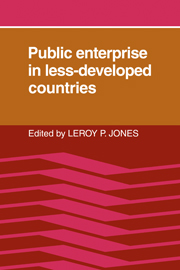Book contents
- Frontmatter
- Contents
- List of contributors
- List of figures and tables
- Preface
- 1 Introduction
- Part I Why public enterprise?
- Part II Principal-agent relationships: Who should control public enterprises?
- Part III How are decisions made in practice?
- Part IV How do public enterprises behave in international markets?
- Part V How does risk alter public-enterprise decisions?
- Part VI How are incentive structures to be designed?
- 14 Performance indices for public enterprises
- 15 Public enterprise versus regulation when costs are uncertain
- Part VII How does public enterprise compare with other intervention mechanisms in overcoming particular problems?
15 - Public enterprise versus regulation when costs are uncertain
Published online by Cambridge University Press: 04 August 2010
- Frontmatter
- Contents
- List of contributors
- List of figures and tables
- Preface
- 1 Introduction
- Part I Why public enterprise?
- Part II Principal-agent relationships: Who should control public enterprises?
- Part III How are decisions made in practice?
- Part IV How do public enterprises behave in international markets?
- Part V How does risk alter public-enterprise decisions?
- Part VI How are incentive structures to be designed?
- 14 Performance indices for public enterprises
- 15 Public enterprise versus regulation when costs are uncertain
- Part VII How does public enterprise compare with other intervention mechanisms in overcoming particular problems?
Summary
Public control of economic activity takes two major institutional forms: public ownership and economic regulation. Of these, public ownership is the more profound. In principle, the government has direct control over the entire range of managerial instruments of a publicly owned enterprise. The institution of economically regulated private enterprise, by comparison, provides the government with only indirect influence on enterprise behavior.
One potential advantage of public ownership and management is the ability of managers to react in the public interest to new information developed at the enterprise level. Although economic regulators can influence the managers of a private enterprise with a system of economic rewards and punishments, the objective of those managers must be in part to serve the interests of the private owners. Of course, large economic enterprises, whether public or private, share the problem that managers may act in their own self-interest rather than in the interest of the owners. However, to the extent that managers, given the information they have, do act in the interest of the owners, public enterprise can be expected to have an advantage over regulated private enterprise in achieving public objectives. In this chapter, I attempt to analyze the factors that determine the size of this advantage for the special case of a publicly owned or regulated industry with uncertain costs. My primary objective is to gain some insight into the value of the information that may be available to the management of a publicly owned enterprise but not available to the public regulators of a privately owned enterprise.
- Type
- Chapter
- Information
- Public Enterprise in Less Developed Countries , pp. 297 - 310Publisher: Cambridge University PressPrint publication year: 1982



